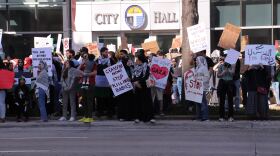Nicka Sewell-Smith spent 20 years searching for her family’s origin. After beginning research on her roots, she discovered that the first generation of college graduates in her family were grandchildren of former slaves.
“When you know your family’s history you’re able to connect back to those seminal events in a different way,” she says. “You actually have a name and information that you can call out that will tie you directly back to those names.”
Because enslaved people didn’t have legal rights prior to 1865, it can be difficult to track them through censuses or birth, marriage and death records. Much of what Sewell-Smith, a professional genealogist, knows about her ancestors comes from oral history, documents and photos that were left behind by grandparents.
In 2017, Sewell-Smith became a consultant with Ancestry.com, which last month released the world’s largest digitized collection of the Freedmen’s Bank and Freedmen’s Bureau, a federal agency created for formerly enslaved people near the end of the Civil War. The agency helped them get food and clothing but also education and legal marriage status in the country.
“It just covered so many aspects of American life. You know, from schools to rations and clothing, it’s an incredible way to learn about what was going on in our country as it tried to stabilize itself after the Civil War,” says Sewell-Smith, who spent 14 years going through the collection image by image.
The Freedmen’s Bureau remained in operation until 1872, which meant that millions of pages of records that officials produced during this period were difficult to access. But now the documents have been digitized, and Ancestry says it’s adding 3.5 million records of previously enslaved people.
The news was greeted with excitement and praise from Yokota Strong, 45, who was able to log onto the company’s website. There, he searched for the names of family members and discovered his third great grandfather, Bush Davis, along with many other sharecroppers from 1867 who worked for a Creole family.
While the news was disheartening, the information brought some clarity on Strong’s family’s unique history and says “this experience has opened my eyes to how complex the institution of slavery really is. It’s made me more aware that there’s more context for my family.”
Like Strong, Ancestry provided a missing link to 26-year-old Dennis Richmond Jr.’s family that he had been searching for since the age of 13. Richmond says when he started researching he was surprised to find his mother’s grandmother’s immediate family.
“For a young Black man living in America, especially in 2021, it’s really empowering to know as much as I know about my family’s history,” he says. “Because as often as people talk about the history of this country, I know where my family was. And I think that’s awesome.”
The online portal includes information like family members’ full names and birth dates. Users like Regina Vaughn can access the portal for free and trace her family’s history back to slavery.
“I was able to find three lines of family. When I read it, I actually cried. I still get choked up because basically in the words of Bryan Stevenson, ‘Slavery didn’t end. It just evolved,” says Vaughn, who thanks her ancestors for enduring slavery and the sharecropping system. “My line of family migrated to Philadelphia in 1917. And so we were able to survive and thrive.”
Marcelle Hutchins produced and edited this interview for broadcast with Todd Mundt. Hutchins also adapted it for the web.
This article was originally published on WBUR.org.
Copyright 2021 NPR. To see more, visit https://www.npr.org.







